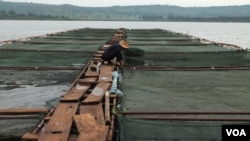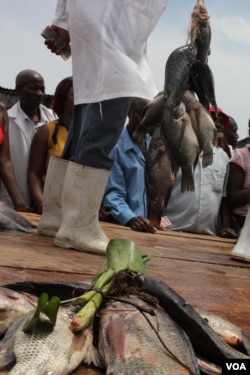KAMPALA —
Fish have long been a top export of Uganda, but Lake Victoria's fish stocks are in steep decline. Now Ugandan authorities are encouraging locals to use a Chinese method of fish farming in cages, hoping it will boost fish exports and reduce pressure on the lake.
Ggaba market in Kampala, on the shores of Lake Victoria, is all about fish. On the pier auctioneers sell the morning’s catch to the highest bidder, while freezer trucks choke the narrow road, and families at plastic tables feast on roast tilapia.
But as fishermen will tell you, business is not what it used to be.
Fred Kasirye has been fishing these waters for 15 years. But with unemployment so high, he said, more and more Ugandan men were trying to make a living on the lake. The effect on fish stocks has been devastating. Ten years ago, Kasirye said, he used to go out with 10 nets. Now uses 50 nets, and still catches less than he did before.
Lucas Ndawula, of the National Fisheries Resource Research Institute, or NaFirri, said the total catch from Lake Victoria has gone down by as much as a quarter in recent years.
“The stocks have been going down, and this has been a direct result of overfishing, especially fishing out the immature fishes. And it’s not enough for the local consumption, for the domestic market and the regional market,” said Ndawula.
Floating in the Nile River in Jinja, just east of Kampala, are fish-filled cages that Ndawula thinks could be the answer to the problem.
“A cage is like a box, but a box made out of net mesh. And also some metallic pieces, and some rocks of course, and some floats. For floats here we use just plastic jerry cans,” he said.
For years fish have been a top export for Uganda, an important source of foreign exchange. Alarmed at declining stocks, the Ugandan government has turned for help to China, where cage fishing is widespread.
A team of Chinese experts is in Uganda teaching NaFirri how to manage cages, growing fish fry and manufacturing feed. While other lakeside countries have experimented with cage fish farming, Uganda wants to roll it out on a large scale.
Ndawula explained that a single cage could produce about five tons of fish at a time, which would earn fishermen more than fishing on the open lake. Cage farming could also free subsistence fishermen from the unpredictable income that kept many mired in poverty, he added.
“Your production is predictable, which is not so with fishing in the wild. You may go out with 100 nets and you come back with two pieces of fish. But if you have your cage and you have looked after these fish very well, you can predict the production, and even the money that you can get from it,” said Ndawula.
But cages are expensive to set up. The materials for just one cage cost twice as much as a basic fishing canoe, not counting the cost of feed and labor. Baker Wasswa, who manages the fishermen's landing site in Ggaba, said this was why cage farming was unlikely to be the miracle solution NaFirri was hoping for.
“For these poor fishermen, they can’t afford cage fishing. For most fishermen it’s not going to work. Cage fishing is for the rich people only. You have to invest much before you get plenty of fish,” he said.
Wasswa suggested that the government could provide loans for people who want to build cages. If that happened, he added, he would like to start cage farming himself.
Ggaba market in Kampala, on the shores of Lake Victoria, is all about fish. On the pier auctioneers sell the morning’s catch to the highest bidder, while freezer trucks choke the narrow road, and families at plastic tables feast on roast tilapia.
But as fishermen will tell you, business is not what it used to be.
Fred Kasirye has been fishing these waters for 15 years. But with unemployment so high, he said, more and more Ugandan men were trying to make a living on the lake. The effect on fish stocks has been devastating. Ten years ago, Kasirye said, he used to go out with 10 nets. Now uses 50 nets, and still catches less than he did before.
Lucas Ndawula, of the National Fisheries Resource Research Institute, or NaFirri, said the total catch from Lake Victoria has gone down by as much as a quarter in recent years.
“The stocks have been going down, and this has been a direct result of overfishing, especially fishing out the immature fishes. And it’s not enough for the local consumption, for the domestic market and the regional market,” said Ndawula.
Floating in the Nile River in Jinja, just east of Kampala, are fish-filled cages that Ndawula thinks could be the answer to the problem.
“A cage is like a box, but a box made out of net mesh. And also some metallic pieces, and some rocks of course, and some floats. For floats here we use just plastic jerry cans,” he said.
For years fish have been a top export for Uganda, an important source of foreign exchange. Alarmed at declining stocks, the Ugandan government has turned for help to China, where cage fishing is widespread.
A team of Chinese experts is in Uganda teaching NaFirri how to manage cages, growing fish fry and manufacturing feed. While other lakeside countries have experimented with cage fish farming, Uganda wants to roll it out on a large scale.
Ndawula explained that a single cage could produce about five tons of fish at a time, which would earn fishermen more than fishing on the open lake. Cage farming could also free subsistence fishermen from the unpredictable income that kept many mired in poverty, he added.
“Your production is predictable, which is not so with fishing in the wild. You may go out with 100 nets and you come back with two pieces of fish. But if you have your cage and you have looked after these fish very well, you can predict the production, and even the money that you can get from it,” said Ndawula.
But cages are expensive to set up. The materials for just one cage cost twice as much as a basic fishing canoe, not counting the cost of feed and labor. Baker Wasswa, who manages the fishermen's landing site in Ggaba, said this was why cage farming was unlikely to be the miracle solution NaFirri was hoping for.
“For these poor fishermen, they can’t afford cage fishing. For most fishermen it’s not going to work. Cage fishing is for the rich people only. You have to invest much before you get plenty of fish,” he said.
Wasswa suggested that the government could provide loans for people who want to build cages. If that happened, he added, he would like to start cage farming himself.

